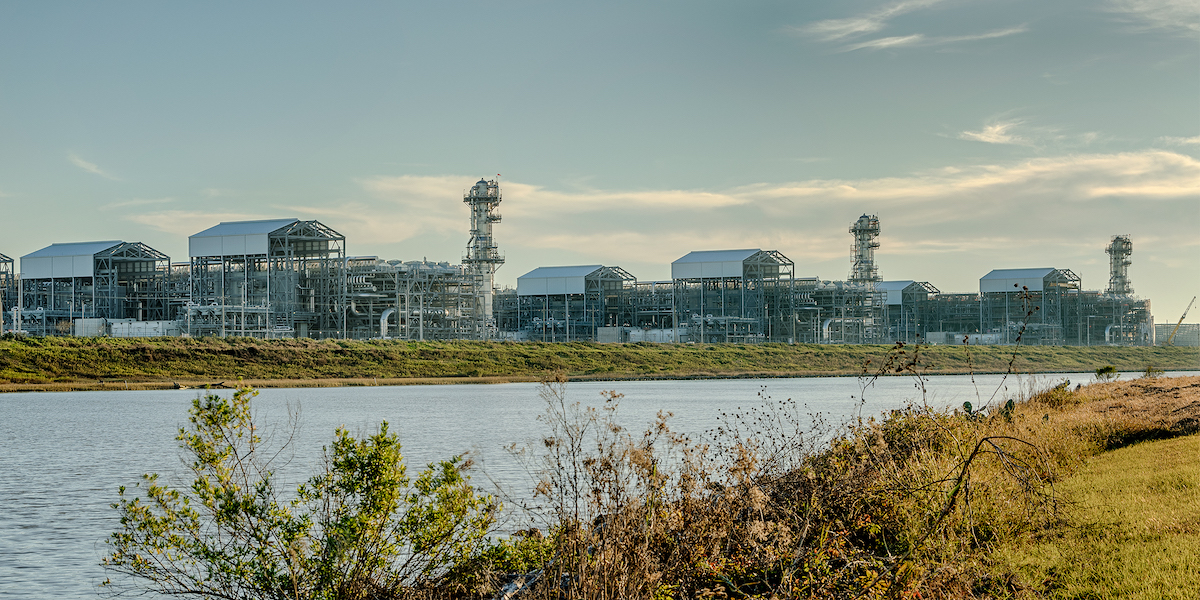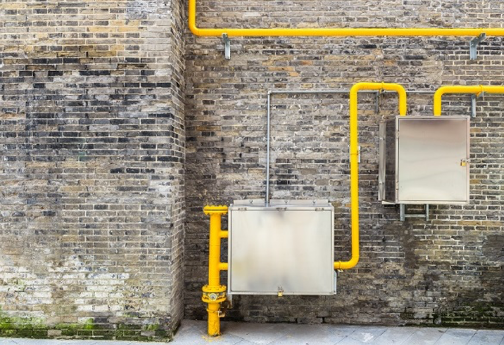March 2020, Vol. 247, No. 3
Global News
Global News
Freeport LNG Starts Commercial Operation of Train 2
Freeport LNG launched commercial operation of the second liquefaction train at its three-train facility, with initial gas deliveries from BP under a 20-year agreement.
The milestone follows the December start of Train 1 commercial operations and the commencement of tolling agreements with Osaka Gas and JERA.
“The performance test on Train 2 was completed in only 37 days after first gas was delivered to the liquefaction facilities, down from 107 days on Train 1,” said Michael Smith, founder, chairman and CEO of Freeport LNG. “We are extremely pleased with the current operational efficiency and performance from both trains.”
Zachry Group, as the joint venture lead, partnered with McDermott International for the Pre-FEED in 2011, followed by FEED works to support the early development stage of the project as a one-stop shop solution provider for Trains 1 and 2. Chiyoda joined the joint venture partnership for work related to Train 3. The project scope includes three pre-treatment trains, a liquefaction facility with three trains, a second loading berth and a 165,000 m3 full containment LNG storage tank.
Construction on Train 3 is essentially complete, Freeport said, noting that gas already has been introduced to the pre-treatment facilities. It is scheduled for commercial start in May.
NDT Global Acquired by Eddyfi
NDT Global acquired by Eddyfi, a transaction that joins a leader in high-performance non-destructive testing inspection technologies with an ultrasonic ILI and integrity services provider.
NDT Global will be rebranded to Eddify/NDT, a private test and measurement (T&M) technology group focused on non-destructive testing (NDT).
“Joining with Eddyfi Technologies offers tremendous opportunity to leverage our respective knowledge to develop even better solutions,” said Richard Matthews, president and CEO of NDT Global.
CenterPoint Sells Miller Pipeline, Minnesota Limited Services
CenterPoint Energy agreed to sell Miller Pipeline and Minnesota Limited to PowerTeam Services for $850 million in cash, subject to customary price adjustments.
Miller Pipeline and Minnesota Limited, which were both acquired by CenterPoint Energy in the CenterPoint Energy-Vector Corporation merger, are among the premier natural gas distribution and transmission pipeline contractors in the United States, providing services to customers in 35 states.
“PowerTeam’s combination with Miller Pipeline and Minnesota Limited creates a powerful platform with nationwide scale,” said Brian Palmer, chief executive officer of PowerTeam, who will serve as the chief executive officer of the combined company.
Miller Pipeline is based in Indianapolis and employs more than 3,500 people. Minnesota Limited has its headquarters in Big Lake, Minn., with peak employment of more than 1,400 employees. The sale is scheduled to close in the second quarter of 2020.
Transneft May Face up to $1 Billion in ‘Dirty Oil’ Claims
Russia’s Transneft faces claims of up to $1 billion related to contaminated oil – more than double its own estimates – setting the stage for protracted haggling with oil suppliers, according to a Reuters report that quoted unnamed industry sources.
Up to 5 million tonnes of tainted Russian oil was contaminated en route to central Europe via the Druzhba pipeline. Organic chlorides were found in Urals crude export flows in late April last year.
State-owned Transneft, operator of Druzhba, has said it would pay compensation of no more than $15 per barrel and has set aside $371 million (23 billion roubles) for compensation. But according to multiple sources and Reuters’ calculations, the claims from Urals buyers average $30-$40 per barrel, or at almost $1 billion.
Germany Needs More Gas Power Plants: Utility, Lobby
Germany must support the construction of gas-powered generation to avoid an electricity supply crunch as it pulls out of nuclear and coal and electric vehicles increase demand, utility Uniper and gas lobby Zukunft Erdgas said.
Calling for a so-called capacity market to pay providers to maintain spare back-up generation, they said the construction of gas power plants had slowed during the transition to massive reliance on wind turbines and solar panels.
Power cannot yet be reliably stored, and Germany needs up to 82 Gigawatts (GW) of capacity at all times to function, increasing to 114 GW by 2030 when millions of electric cars begin to hit the roads, figures from the Cologne research institute EWI said.
“There has to be a consensus on how we want to safeguard supply security in future,” said Andreas Schierenbeck, chief executive of Uniper, which operates 3.3 GW of gas capacity in Germany. “As long as that has not been clarified, nobody will build power plants and invest in modern technologies.”
Canadian Court Dismisses Challenge to Trans Mountain
Canada’s Federal Court of Appeal dismissed a challenge to the approval by Prime Minister Justin Trudeau’s government of the Trans Mountain oil pipeline expansion, clearing some uncertainty from the project.
The court said in a written decision that the government held “reasonable and meaningful” consultations with indigenous groups as required by law.
“The evidentiary record shows a genuine effort in ascertaining and taking into account the key concerns of the applicants, considering them, engaging in two-way communication, and considering and sometimes agreeing to accommodations,” the court’s three-judge panel wrote. “Contrary to what the applicants assert, this was anything but a rubber-stamping exercise.”
Ottawa bought the 67-year-old pipeline, which runs from Alberta to the British Columbia coast, in 2018 from Kinder Morgan to ensure expansion proceeded. The project, which is under construction, would nearly triple capacity to 890,000 bpd by the third quarter of 2022.
The Trans Mountain expansion is expected to cost C$12.6 billion ($9.47 billion), a sharp increase from the previous estimate of C$7.4 billion, the pipeline company’s chief executive said last month, due to court and regulatory delays, rising costs of steel, land, labor and security, and accommodations for indigenous groups.
Congested pipelines have forced the Alberta provincial government to curtail production to reduce a glut in storage that has weighed on prices and led to layoffs.
Police Arrest 33 Protesters Opposing Gas Pipeline
Police arrested 33 people after indigenous protesters against construction of the Coastal GasLink pipeline blocked access to Vancouver ports. The arrests resulted from an injunction granted by a British Columbia court to restore access to ports. Port Metro Vancouver is one of Canada’s biggest ports, and police say protesters received several requests and warnings to clear the area prior to the arrests.
The C$6.6 billion ($4.97 billion) pipeline, to be operated by TC Energy Corp, is set to move natural gas from northeast British Columbia to the Pacific coast, where the Royal Dutch Shell-led LNG Canada export facility is under construction. In December, private equity firm KKR & Co Inc and Alberta Investment Management Corp agreed to buy a 65% stake in Coastal GasLink Pipeline.
Protests have been ongoing since Wet’suwet’en hereditary chiefs opposed an agreement to build the Coastal GasLink pipeline, saying they hold authority over traditional lands, not the elected indigenous band councils the provincial government had consulted.
About 28% of the 670-km (420-mile) route passes through Wet’suwet’en lands. Construction has continued along other parts of the pipeline route.
Federal Judge Orders Recall of Non-Standardized Pipeline Flanges
Judge Andrew S. Hanen of the United States District Court for the Southern District of Texas, Houston Division has issued a permanent injunction and ordered a recall of flanges made by Spanish company, Ulma Forja – part of the Mondragon Corporation – and its U.S. subsidiary, Ulma Piping.
The Court found that Ulma, which provides flanges for use in American pipelines, refineries and chemical plants, “intended to deceive customers by mislabeling the flanges” and even did so after 2017, when the original lawsuit was filed by American carbon steel flange manufacturers Weldbend and Boltex.
A jury last October ruled in favor of Chicago-based Weldbend and Boltex, who sued Ulma after metallurgical testing indicated that Ulma’s flanges were not heat-treated and did not meet industry standards as claimed by its advertising. Hansen’s ruling last month also ordered Ulma to “recall any product which purports to be normalized,” which has not been normalized per ASTM international standards.
Enterprise Products Wins Ruling in Legal Battle with Energy Transfer
Houston-based Enterprise Products Partners won a favorable ruling from the state Supreme Court appeal in its legal battle with Dallas-based Energy Transfer, resolving a dispute that began when Enterprise backed out of the proposed Double E pipeline project in 2011.
Although definitive agreements were never executed and Enterprise never got approval from its board of directors, Energy Transfer said it was misled when Enterprise pulled out of the deal, partnering instead with Enbridge to complete the expanded Seaway pipeline system.
A Dallas jury sided with Energy Transfer in a 2014 decision that Enterprise breached its fiduciary duties, awarding ET $535 million in damage. A panel of the Dallas Court of Appeals later issued a unanimous opinion reversing that verdict, and the Supreme Court of Texas unanimously affirmed that ruling in its February decision.
Analysts Cut China’s Gas Demand Estimates Due to Virus
The fast-spreading coronavirus outbreak is expected to depress industrial, commercial and transportation gas demand in the coming months for China, the world’s top gas importer.
Analysts who provided their views for China’s gas demand to Reuters said they have cut their gas demand forecasts. Estimates among the five analysts varied, with two of them predicting demand will expand by just 6% this year, compared with nearly 10% growth expected in 2019. Official full-year figures for 2019 have yet to be released.
Lower growth will likely affect imports of liquefied natural gas (LNG) the most as they are typically more expensive than pipeline gas imports. China’s LNG demand is now only expected to grow by 4% year-on-year, compared with previous estimates of 13%, Bernstein analysts said.
The coronavirus outbreak could delay the supply-demand rebalancing that was expected in 2020, analysts from Fitch Ratings said in a note.
If spot prices remained below $3, they would not cover half-cycle production costs for the United States and other producers, leading to production shut-ins and reduced supplies, they added.
“A prolonged period of low spot prices could also spark contract renegotiations between suppliers and customers in Asia, where contracts are oil-linked, and slow down prospective projects,” they said.







Comments